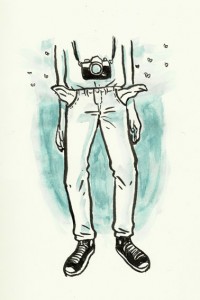Canadian Store (CAD)
You are currently shopping in our Canadian store. For orders outside of Canada, please switch to our international store. International and US orders are billed in US dollars.
This is the first of a two-part series in which Miranda Campbell discusses privilege, poverty, and youth creative work.
Are young people aspiring to creative careers just a bunch of whiny trust fund brats? In the pilot episode of HBO’s hit series Girls, 24 year old Hannah Horvath is trying to make it as a writer in New York City. Confronted with the reality of having to financially support herself after her parents decide to cut her off, she begs for “$1100 a month for the next two years.” Creator Lena Dunham is offering her character’s sense of entitlement up for comedic effect, but where’s the joke? Who is laughing at whom, and why? The Nation compares Hannah’s privileged upbringing and newfound experience of being broke to Fiona Gallagher’s working class reality of poverty in Shameless, but concludes that in today’s economically grim times, the distinctions between downwardly mobile, underemployed youth and the working poor may be becoming muddy.
If youth who pursue creative careers aren’t entitled brats, then the British Columbia government sure seems to think so, with their advertising campaign that stated “hipster is not a real job,” designed to persuade youth to consider a career in the skilled trades. “Hipster” might not be a job, but increasingly, small-scale creative careers are, and this work is characterized by low pay, uncompensated labour, long hours, short-term contracts, and precarity. Many young people forging creative careers for themselves are facing the challenges of trying to support creative enterprises while working other, unrelated jobs.
 |
| Illustration by Adam Waito |
Meanwhile, the ambiguously-defined “hipster” remains a figure of ridicule and blame. Salon has profiled the backlash against young creative types spending their food stamps on organic fare. Underlying these critiques is a perception of the supposed invalidity of the hipster’s experience of poverty, or as the Jacobin puts it, “the conclusion that someone is lazily taking advantage of the system.” The Jacobin terms this “the ‘fucking hipster’ show,” suggesting that the term “hipster” is a meaningless catchall for a youth scapegoat who doesn’t exist. The hipster blame game replaces any actual analysis or “depiction of downward mobility among artists, anarchists and other riffraff.”
It’s difficult to openly talk about poverty because of persistent shame and stigmas. One blogger with a MFA in creative writing states “I haven’t been talking about how poor I am in a serious way or how terrifying it is to be on the cusp of my 30th birthday, wondering when I’ll have enough quarters to do laundry again.” She argues that “the fact is, we can no longer tell someone’s financial reality by what they eat, how they dress, and where they grew up.” Regardless of what someone eats, wears, or the economic conditions of their upbringing, poor is poor. This poverty might be experienced while pursuing creative pursuits, but these pursuits are not just some idle luxury for privileged rich kids.
In an economy where permanent full-time work is evaporating, small-scale creative projects are not an indulgence, but increasingly are an employment avenue, and involve commitment, frustration, and above all, work. If we’re talking too much about skinny jeans and not enough about shrinking social safety nets, how can we shift the terms of this conversation?
 Miranda Campbell maps the changing realities of youth creative self-employment in the 21st century in Out of the Basement: Youth Cultural Production in Practice and in Policy
Miranda Campbell maps the changing realities of youth creative self-employment in the 21st century in Out of the Basement: Youth Cultural Production in Practice and in Policy
 back to all news
back to all news
[…] by Miranda Campbell for the McGill-Queens University Press. I highly recommend you check it out here. When the memo went out that hipsters are nothing more than creative self-entitled post-grads, […]